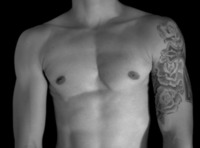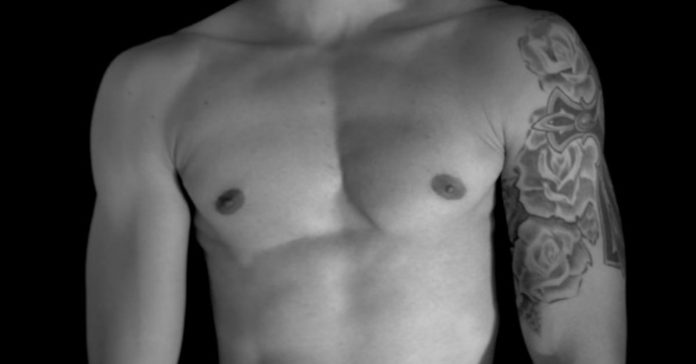[ad_1]

Three months before high school graduation, I had a mammogram.
It was the mid-’90s. What I knew about mammograms at the time was women my mom’s age had them – not teenage boys. Yet there I sat one afternoon after school, bare-chested, as a nurse maneuvered the skin she could grab between two flat plates. As I soon found out, men can have breast cancer.
I was living in Texas, where being a man is non-negotiable. How much can you bench press? How many beers can you chug? and How fast is your car? were common questions. I was not the guy with impressive answers to any of these.
As it was, I took theater class and sang in the school choir. I wasn’t on any sports teams – never had been. I was already teetering dangerously close to the edge of not being a guy at all. That I might have breast cancer in this hyper-masculine world was highly ironic.
One in eight women are expected to have breast cancer in their lifetime. Of all breast cancer cases, less than one percent are men. It does happen.
Men have mammograms, as I did, and as women do, to help pinpoint a mass that doesn’t belong. Breast cancer in men, while far less common, is also more likely to be lethal. That’s not because it’s more extreme, but because recognizing signs, knowledge of the possibility, seeking diagnosis or taking it seriously is more rare.
Months before my mammogram, I felt a growth above my right nipple. It slowly grew until I could see it – the size of a Cheese Puff – hard and painful to touch. I didn’t tell my parents at first. After a while, I couldn’t ignore it. When they finally saw and felt, it quickly became doctor-worthy. I never thought about breast cancer.
My mom and I went to see a specialist. He was a friendly, gray-haired guy, super chatty. He prodded and nodded – then the word surgery came up. I sat, quiet, listening to his voice. He wanted to remove the growth just in case, he said. But it probably isn’t cancer. I was confused. I think it’s fine. Let’s carve it out anyway.
I looked at my mom as we drove home from the doctor’s office that afternoon – her eyes directly on the road. She later said reality didn’t sink in until she saw the word mastectomy on the hospital chart.
Why did just-in-case surgery have the same name as when a cancer-ridden breast is cut off?
Before the surgery, I kept it secret. I shuddered to think of the ridicule if anyone knew I was having breast surgery. The surgery was set for a Friday. I told only one person – a teacher – because I wouldn’t be there to hand in a paper that was due.
I only said surgery and didn’t elaborate. She pushed for details. I leaned in close and almost whispered as I explained the rest. She looked at me with her head cocked sideways and a slight smile – unsure what to say. It’s a look I would come to know well.
There’s only one thing I remember about surgery. After it was over I came to, sat up on the gurney, and said to the nurses, sleepy but definitive: “Don’t let my mom see my tattoo!” They laid me down and laughed.
I wasn’t joking. The year before, I had gotten my first tattoo. My parents didn’t know. This was not the time to reveal. I showed it to the nurses. They agreed to keep it covered by my hospital gown. The rest of the day is blank.
I tend to tell the funny parts of that bizarre time when I share with friends. What I don’t share with him is what it felt like to have exploratory surgery for cancer at eighteen. I never do.
It was after the breast surgery when the worst part began. The incision caused puss to build up. I had to wrap my right side tight with a bandage. As days went by and puss pooled under the skin, my breast looked like the saggy boob of a 70-year-old woman.
It felt like a woman’s body was invading mine, at a time I was desperate to be anything but. As dreadful as wearing what I called my “half bra” was seeing my lopsided chest.
I wouldn’t look in the mirror. My body was betraying me. Not only grotesque, it was the way it was happening. The growing boob, more than the mass that was cut out, became the worst offender.
Each week the doctor drained the puss. I went to his office alone. As he chatted about the weather, he would insert a thick needle above my nipple and start pressing.
I could feel the needle under my skin as he pressed. Bloody yellow liquid spewed into an enormous syringe. The pain was outrageous. But I didn’t want a saggy boob anymore. I went back dutifully for two months until the puss stopped, determined to grin and bear it.
A few weeks after surgery came Spring Break, which, for the crowd I partied with meant South Padre Island. A “Girls Gone Wild” video gives an accurate idea. Juicy vodka shots. Crushed beer cans. Speeding jeeps, kids barely hanging on. A would-be driver passed out next to a car, keys hanging from the door.
It was a testosterone-fueled, gotta-get-drunk, days-long party. I was still wearing a half bra.
I got drunk morning ’til night, like everyone else – except I drank to numb embarrassment more than to party. Sometimes, I was the only one on the beach – boy or girl – with a top on. Worry about sunburn seemed an acceptable excuse.
I never considered not going. I didn’t want to miss out. It was that time in high school when everyone is convinced life’s last hoorah is near. Still, I only stayed until Tuesday, then drove home alone. The boob needed draining.
In the end, the biopsy did not reveal cancer. I don’t remember getting that information or how long it took.
What I do remember is how desperate I was to keep anyone from knowing about the breast surgery and half bra. I remember how horrified I was at the way my body changed, how for a time I wore perhaps the most definitive display of femininity.
That’s the strength of the masculine ideal. The lingering anxiety about not seeming like a man still blinds me to the fact this could have been cancer.
In the end, the doctor did a great job. You’d never know I had surgery. One tiny scar runs along the dark, top part of my nipple. Still, it’s sensitive. It hurts when it’s bumped, or cold, or when thin sprays of water from a shower hit it.
The only time it really bothers me is when I’m getting physical with someone who tries to nibble on it. I flinch. This chapter from my past is not something I want to share in the heat of the moment. It’s still breast surgery, after all.
Several years ago, on the Mall in D.C., I did a benefit run with a friend to raise money for breast cancer research. Joining us were hundreds of women who wore pink shirts with the names of loved ones – lost or battling breast cancer.
I didn’t tell my friend about my breast surgery or the boob, discomfort at the memory resurfacing. Even so, I felt the sobering reality of a shared bond with these women few men will ever know.
This post originally appeared on the Good Men Project. Reprinted with permission.
About the author: Kevin Wood is a writer, and an Editor at the Good Men Project. A former teacher, he also works as an education consultant. He lives in Brooklyn, NY.
For more from the Good Men Project:
Breast Cancer Awareness In Men
Everything you Need to Know About Male Breast Cancer (and Probably Didn’t Know to Ask)
When My Husband Got Breast Cancer
[ad_2]
Source link





















